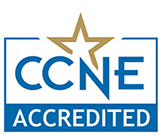Bachelor of Science in Nursing
Improving the nation’s health in the twenty-first century requires increasing the variety of care delivery settings available to the general population. Professional nurses of tomorrow must be prepared today to meet the challenges of highly complex health care needs and services for people of our communities and globally. The curricular emphases in baccalaureate nursing programs on health promotion and healthy behaviors, coordinating cost-effective quality care, community-focused health care, and the evidence-based practice, are particularly appropriate to achieving the future’s agenda. It is estimated, however, that the next decade’s demand for baccalaureate-prepared nurses will continue to exceed their availability.
Accreditation
The baccalaureate degree programs in nursing, master’s degree programs in nursing, and post-graduate certificate programs in nursing at SUNY Polytechnic Institute are registered by the New York State Education Department and are accredited by the Commission on Collegiate Nursing Education, 655 K Street, NW, Suite 750, Washington, DC 20001, 202-887-6791. For more information, see: www.aacnnursing.org/CCNE.
Vision
To be the premier innovative cornerstone of nursing education in New York State through the use of technology within a caring context
Mission
The mission of the Nursing Faculty is to create a caring transformational environment that promotes professional excellence, lifelong scholarship, and innovation in nursing. We provide evidence- based nursing education that prepares learners to meet health care needs within our local and global communities through technology, leadership, and collaboration. (TLC)
Undergraduate Student Learning Outcomes
At the completion of the baccalaureate program, the life-long learner will be able to:
- Synthesize theoretical and empirical knowledge in nursing and from related arts, sciences, and technology essential for professional practice.
- Apply theories of caring, health promotion, leadership, and management to meet health care needs of clients and families within culturally diverse communities.
- Integrate concepts of critical reflection, collaboration, and evidence based practice through effective communication, to foster independent judgment and decision making in one’s practice.
- Engage in collaboration with clients, health care professional, and organizations to provide safe, high quality healthcare.
- Model nursing excellence and professionalism in all aspects of clinical practice with individuals, families, and communities.
- Cultivate values of caring, cultural diversity, altruism, social justice, advocacy, and ethical decision making in the provision of health services to clients.
- Exhibit principles of leadership to ethically, effectively and efficiently use resources for enhancing the practice environment and improving patient care outcomes.
- Apply principles of teaching and learning in health promotion, risk reduction, disease management, and rehabilitation activities for the improvement of health outcomes.
- Explore innovative approaches, as a change agent, to healthcare through research, continued professional development, and the application of technology.

